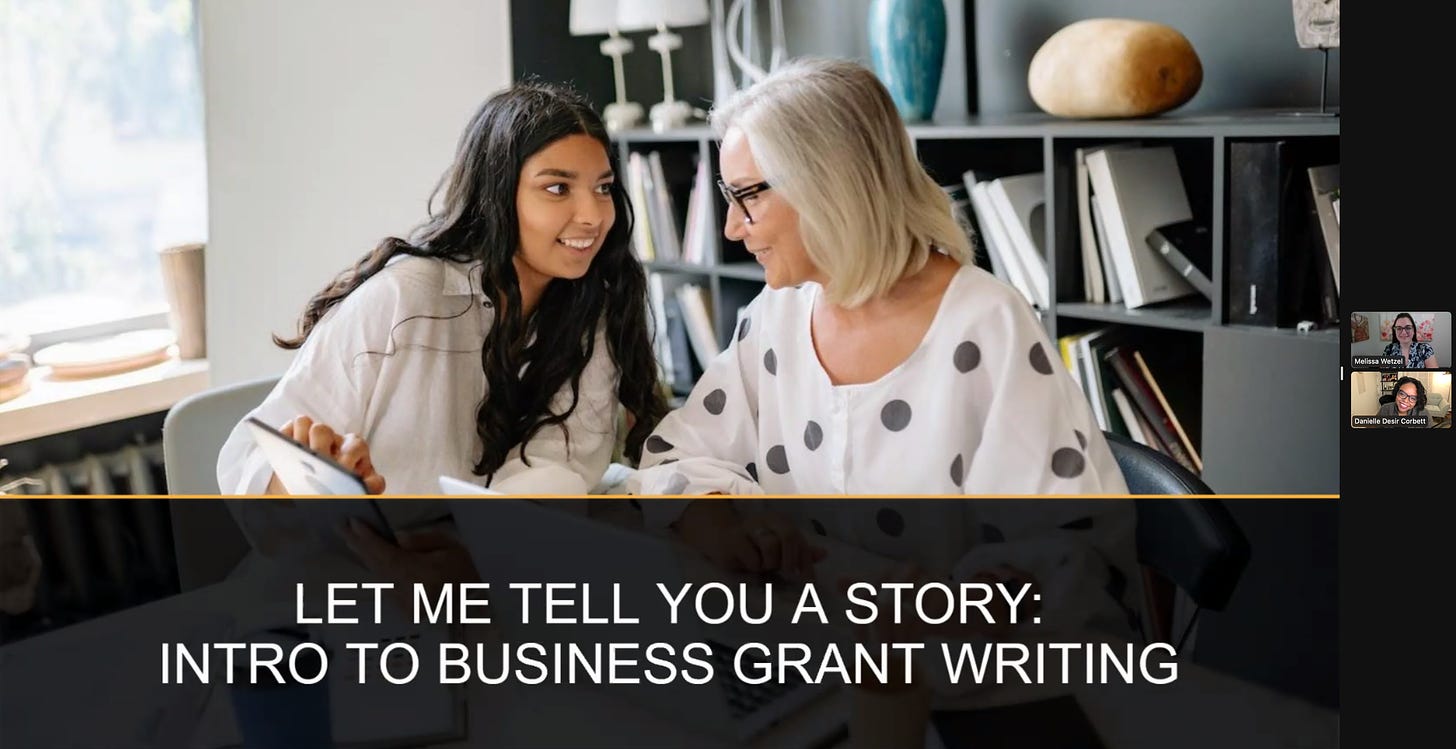My (3) Big Takeaways From the Intro To Business Grant Writing Workshop
How I'm approaching grant applications differently in 2023.
I’ll be the first to admit that grants weren’t on my radar as a creator for five of the seven years I’ve been in the business. It only crossed my mind once I saw a funding opportunity in 2020 that was the perfect fit for my personal finance podcast.
Winning that grant spiraled into winning three other awards. In 2022, I won a trademark scholarship and branding coaching, which have been invaluable for my business — so keep an eye out for those non-monetary awards too!
Since becoming wise to the wonderful world of for-profit grants, I’ve gotten really good at finding funding opportunities. My grant-finding skills are why we are all here gathered around this newsletter campfire. 🔥
But finding grants goes hand in hand with grant writing.
In the for-profit space, applicants will likely win one award for every ten grant applications, a 10% win rate.
Grants are extremely competitive, but every so often, I’m encouraged because a fellow creator who subscribes to this newsletter sends me a note that they’ve won an award. Most recently, congrats Zach! 🎉
Creators are winning funding regardless of the odds, and I’m here 👏🏾 for 👏🏾 it.
So, what does this mean for creators in particular?
Improving our grant writing skills will improve our odds of funding.
Yesterday, I co-hosted a grant writing workshop alongside experienced grant writer Melissa Wetzel, CFRE, who has helped nonprofits secure millions in funding throughout her 20 years of experience. I want to share my (3) big grant writing takeaways from that session and how I’m improving my strategy.
There are still spots available to join us LIVE on Tuesday, January 24th, at 1 pm EST. Cannot join us live? No worries, the replays will be available to watch the training and access resources like grant writing prompts, sample grant applications (!!!), a video submissions guide, and more.
Access Introduction to Business Grant Writing ($97) here. Feel more confident knowing how to tackle (3) common questions on grant applications. Ditch the overwhelm and second-guessing by learning how to conduct research, motivate funders, and secure your coin.
Eligibility goes beyond the application.
In this grant writing workshop, I learned to go beyond reviewing the funding opportunity to qualify for eligibility.
If you’re wondering what else you have to do, keep reading.
In addition to evaluating the grant application, what do you have in common with the funder? Do you serve the same community?
Does the grantor’s mission match your mission? Are you aligned?
In the workshop, Melissa offers insights into how to go about qualifying mission and vision alignment and what resources to review before you decide if you’ll toss your name into the hat.
Tense consistency.
This insight started as a grammar tip but gave way to a bigger idea.
While reviewing one of my winning grant applications, Melissa pointed out I hadn’t used consistent tenses — I switched from the third person to the first person in my personal statement.
While on the surface, it sounded like a grammar tip; it made me realize that instead of seeing grant applications as answering separate questions, what if I let the questions guide the story I tell? So even if the questions were erased, the reader could follow along.
Melissa said: “I typically tend to write in first person unless I see that it is an incredibly formal grantor, and then I would write in third person, but again, part of the art of storytelling is to put them in your shoes and so you need to be in your own shoes first. But I would say stay consistent with the tenses. So if you start third person, then you go all the way through that way.”
From now on, instead of answering questions in grant applications, I’m telling my story.
Things aren’t always straightforward.
One of the popular questions we see on grant applications is — “how will you use the funds?”
I always wondered if I should volunteer a budget breakdown or not.
Melissa put things into perspective. She said, “You want to get as specific as you feel comfortable, particularly if it's open-ended. But you want to make sure you're giving them an idea of how those dollars are going to impact your community.”
So yes, I plan to use $2,000 to purchase podcasting equipment…but…how will this purchase positively impact my community?
Grants provide money to solve a problem, not pay our bills. What problem are you trying to solve, and how will funding support your quest?
Overall, attending this workshop taught me what funders are looking for and how to craft a compelling application that shares my story, makes a personal connection, and demonstrates the problem I hope to address. I see grants through a new lens, equipped with a solid framework to improve upcoming submissions.
If you enjoyed this post, you’d appreciate Introduction to Business Grant Writing which shares how to confidently use the art of storytelling to craft a thoughtful personal/business statement and impact statement. Plus, access our exclusive library of sample grant submissions + feedback from an experienced grant writer, grant writing strategy worksheets, writing prompts, and a video guide (because it feels like every grant wants video).
Until next time!
Danielle Desir Corbett
P.S. Prefer to put pen to paper as you write out your thoughts? Our physical 115-page grant writing journal is now available on Amazon, featuring 16 grant writing prompts to get those grant writing juices flowing - Journal Prompts for Business Grant Writing.




